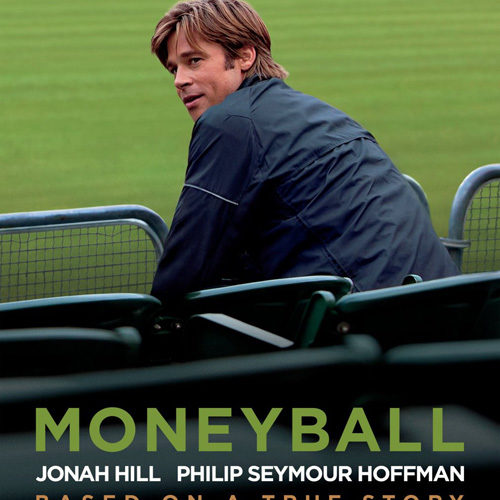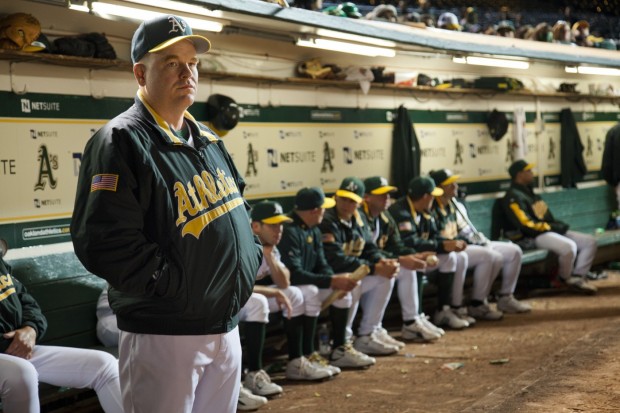Writer Aaron Sorkin seems to captain magic when it comes to making potentially boring and tedious scenes exciting, fun and nail-bitingly entertaining. And while Sorkin’s name isn’t alone the script – with fellow great scribe Steve Zallian credited as well – one can’t help relate director Bennett Miller‘s Moneyball to Sorkin’s other works.
Talking baseball statistics should be dull. It’s not exactly an entertaining concept, nor does it lend itself to a cinematic adaptation. But, like The Social Network, Moneyball manages to turn those proverbial inside baseball chats into rapid-fire banter that are far more exciting than any action set-piece we’ve seen this year. Words are action in this world – propulsive, heart-pounding action.
This drama would make for a perfect double-bill with David Fincher‘s coming-of-age film. Thematically, tonally and in regards to their lead character, they are near-companion pieces. Both are about ambitious characters driven from a past failure; Zuckerberg’s drive comes from a girl, Oakland A’s general manager Billy Beane’s (Brad Pitt) from a decision he made as a young man that still haunts him. On the outside, they hide their true selves. Zuckerberg comes off condescending and like an “asshole,” but underneath his wall of drive is a socially-damaged young man. Beane acts cocksure and confident, but he doubts his every decision.
Like the Facebook creator, that ambition doesn’t come from a desire for cash or fame, but to prove something to others, as well as himself. These are admirable characters, though one is more likable than the other, of course. Both characters require subtle and internal performances, and Brad Pitt delivers in a way he never has before.
There’s a sadness to Billy Beane. A failed MLB (Major League Baseball) prospect who lost his wife to a mellowed-out dweeb (whose shoes are filled by a tremendous cameo), he’s on the verge of losing his job and is trying to advance in a world that doesn’t want to – the world of the MLB. Interestingly, the film is almost more so about the world of baseball changing more so than the characters in said world. Beane, relatively, remains the same man throughout most of the narrative.
Beane’s change is small but potent, finding success in a place he’s gathered much of his underlying doubt. A part of that success comes from his semi-pal, Peter Brand (Jonah Hill). Brand represents the future of baseball, and since Beane is only interested in moving forward, the two strike a partnership. It’s not exactly a “friendship” – although, they do share some memorable banter together – but they’re connected through their forward-thinking.
And yet, while it’s subject is about renovation, Moneyball is an old-school drama about underdogs. It’s been six years since director Bennett Miller‘s Capote, and it was worth the wait. Both smart and funny, Miller’s film is more than your average “sports” film.
Moneyball is now in wide release.



